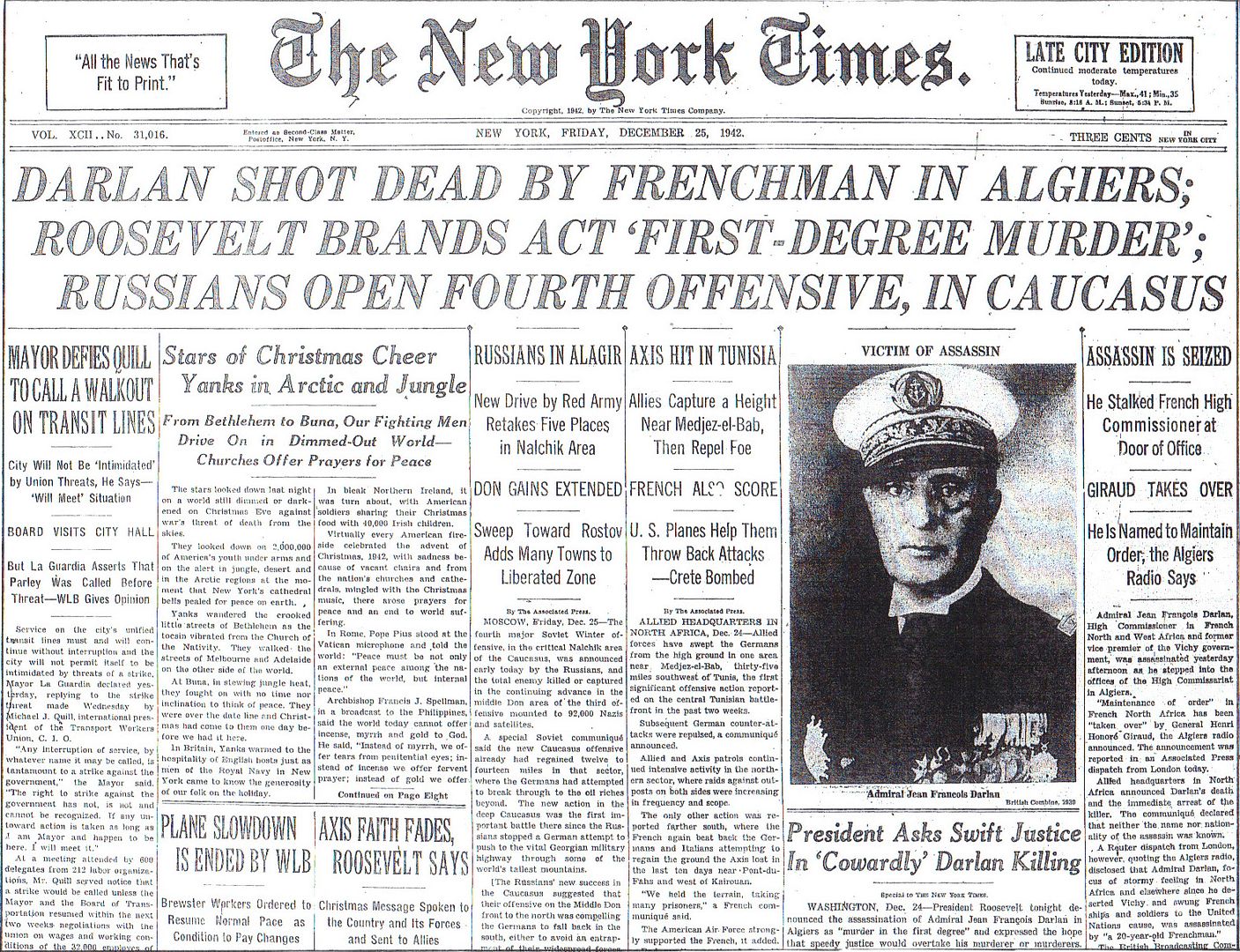
Posted on 12/25/2012 6:59:10 AM PST by Homer_J_Simpson

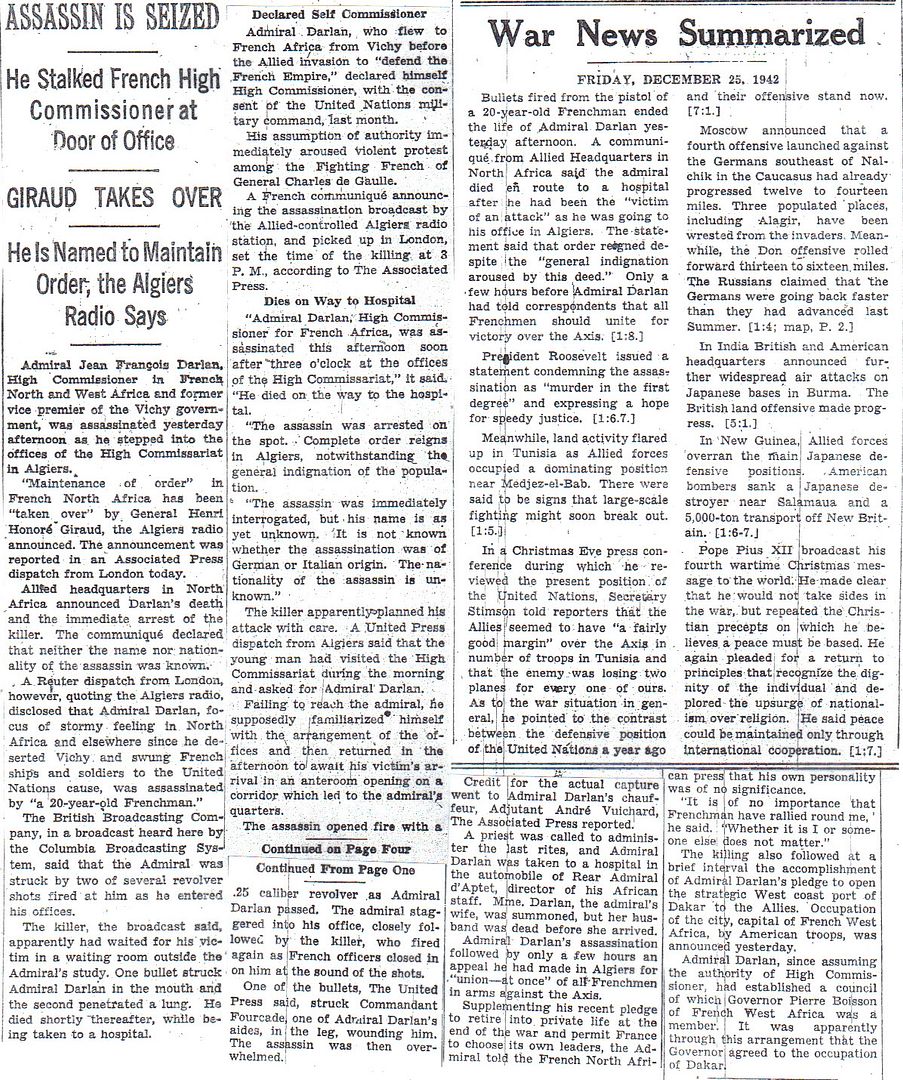
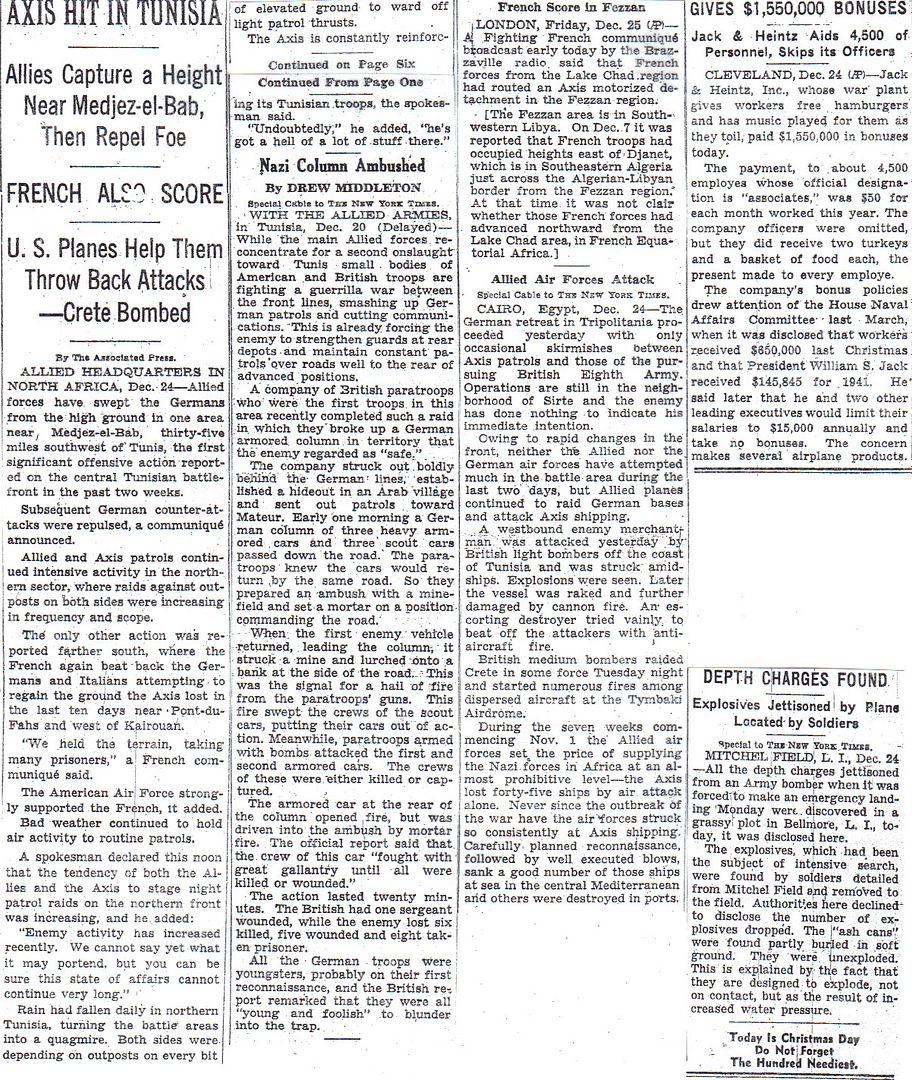
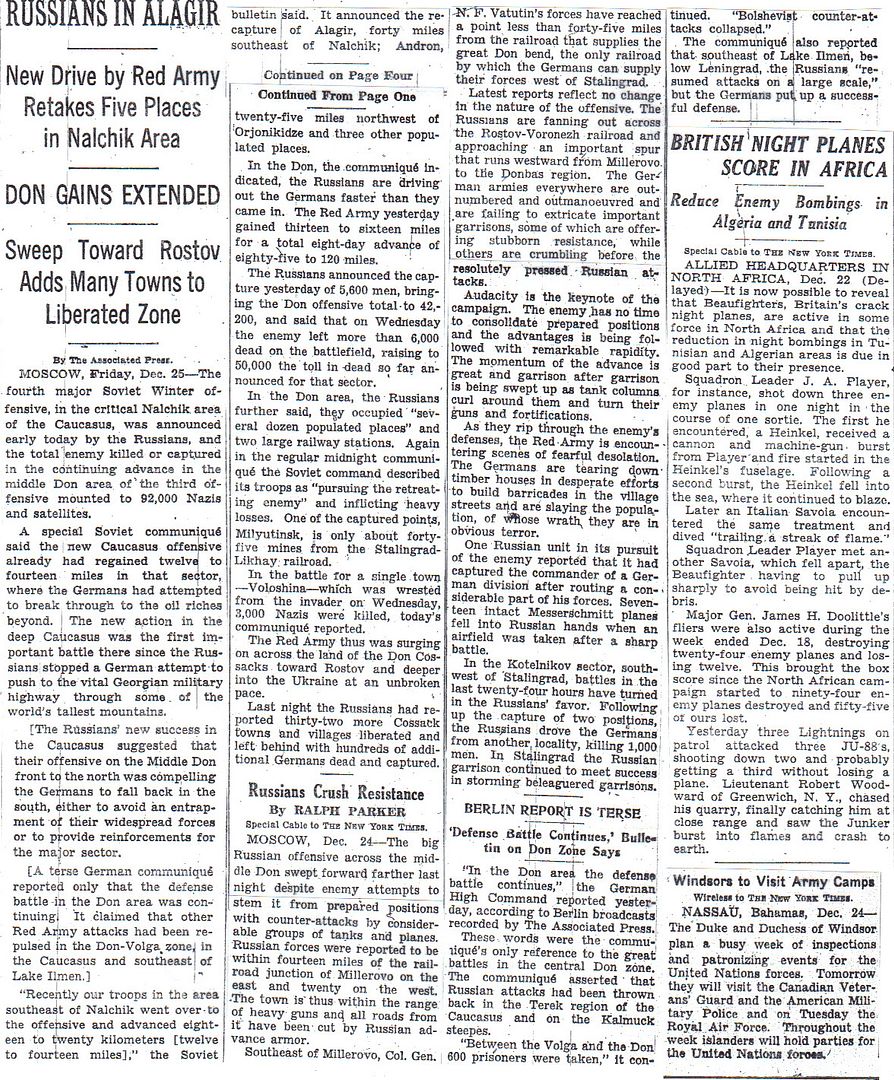
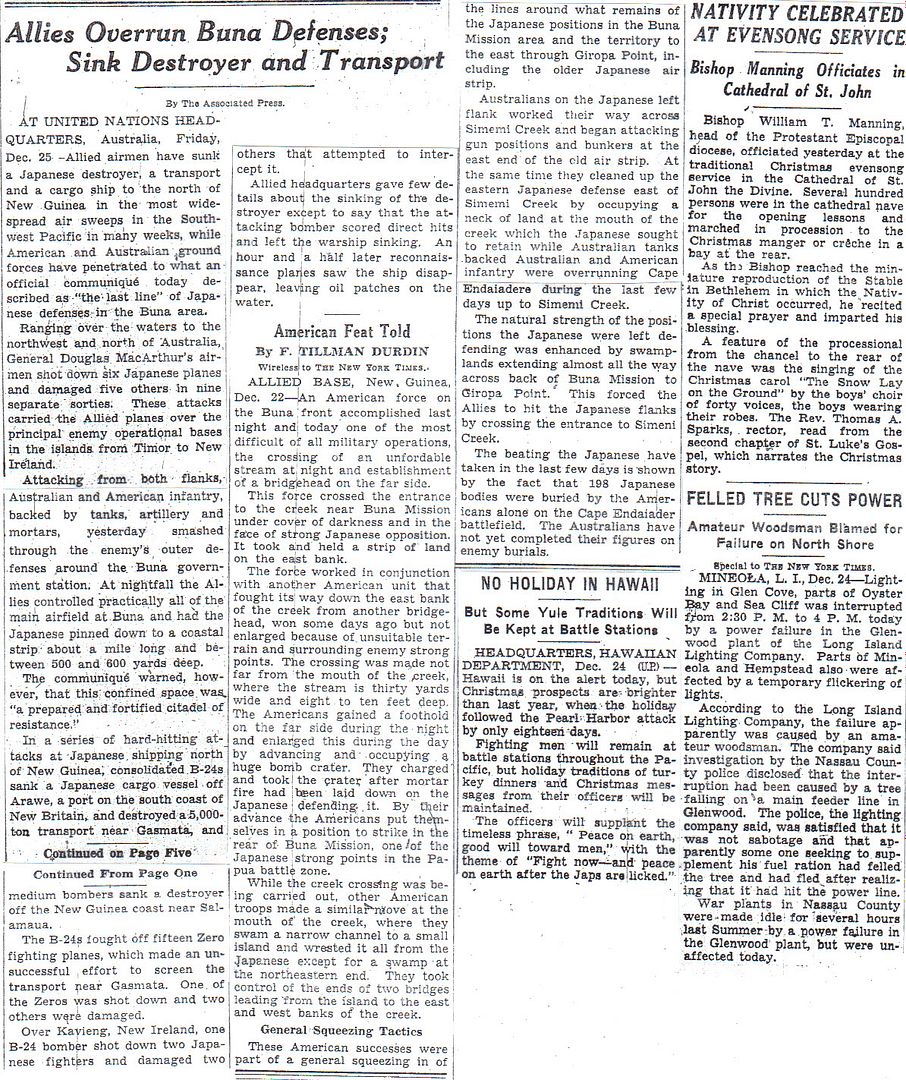
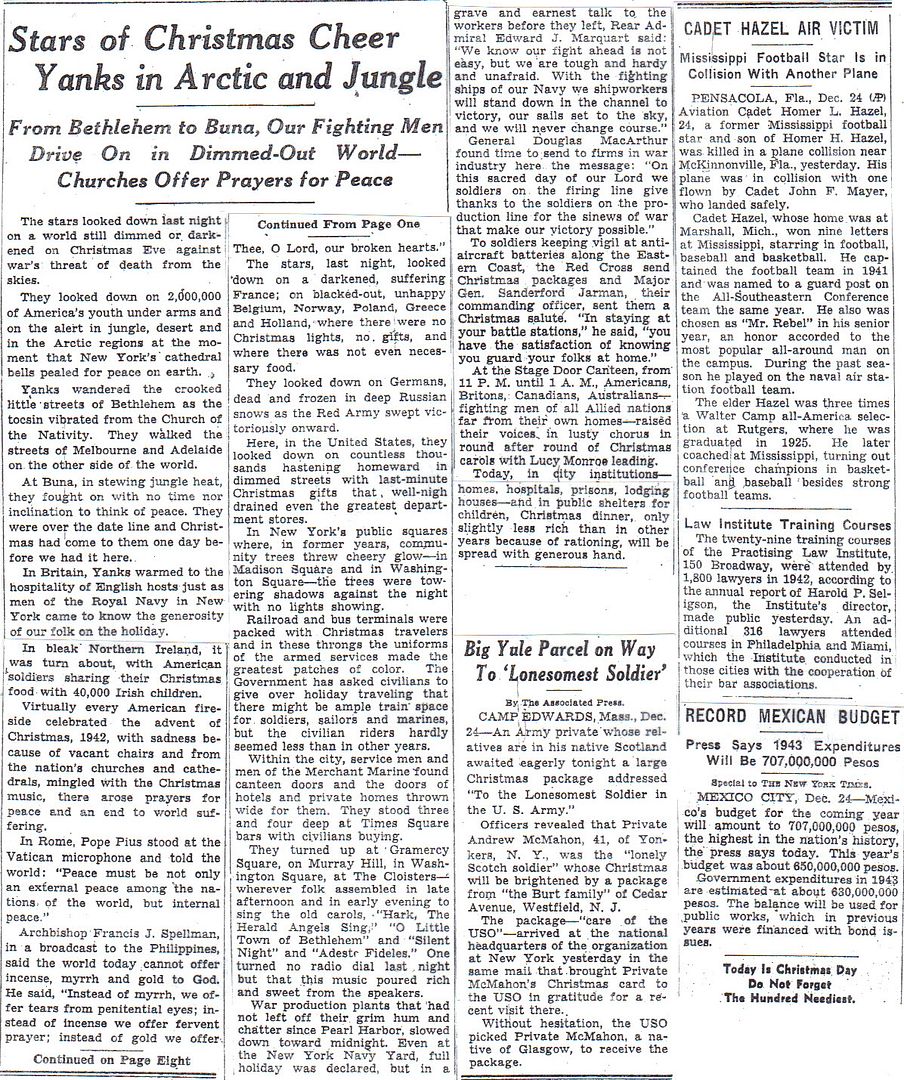
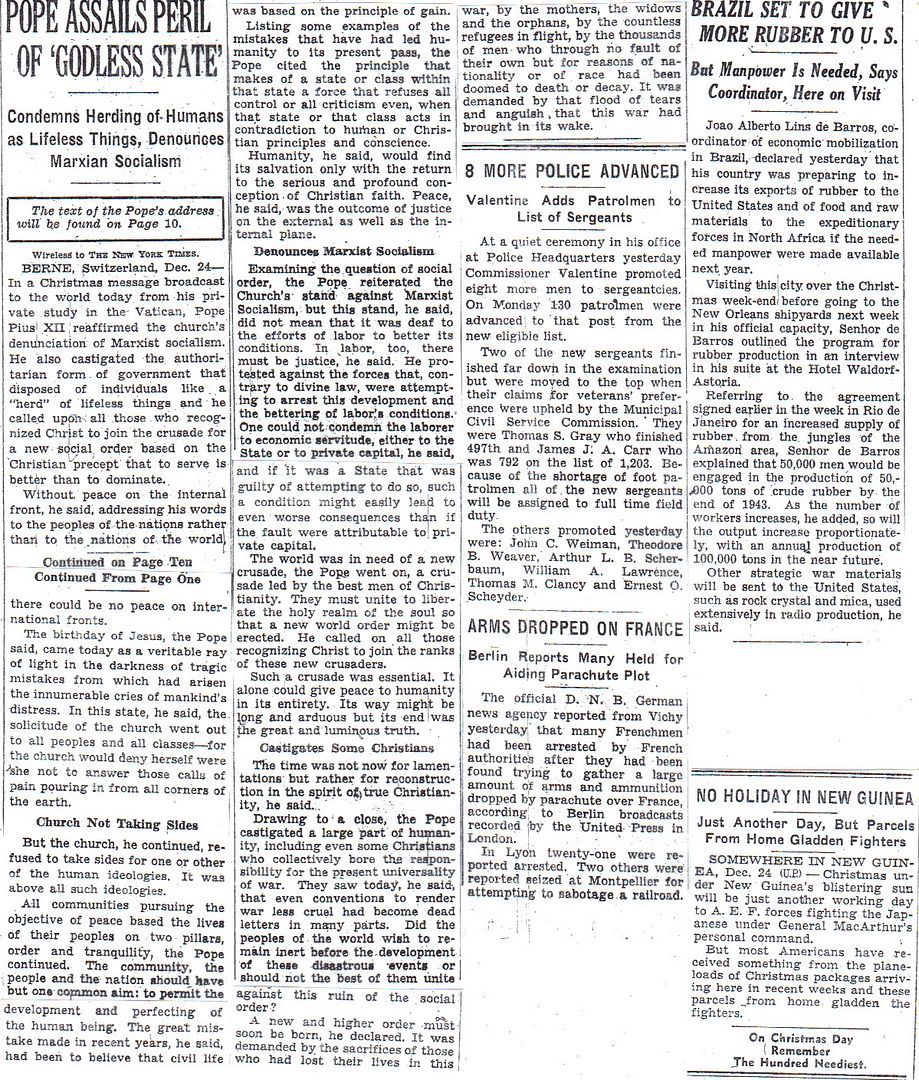
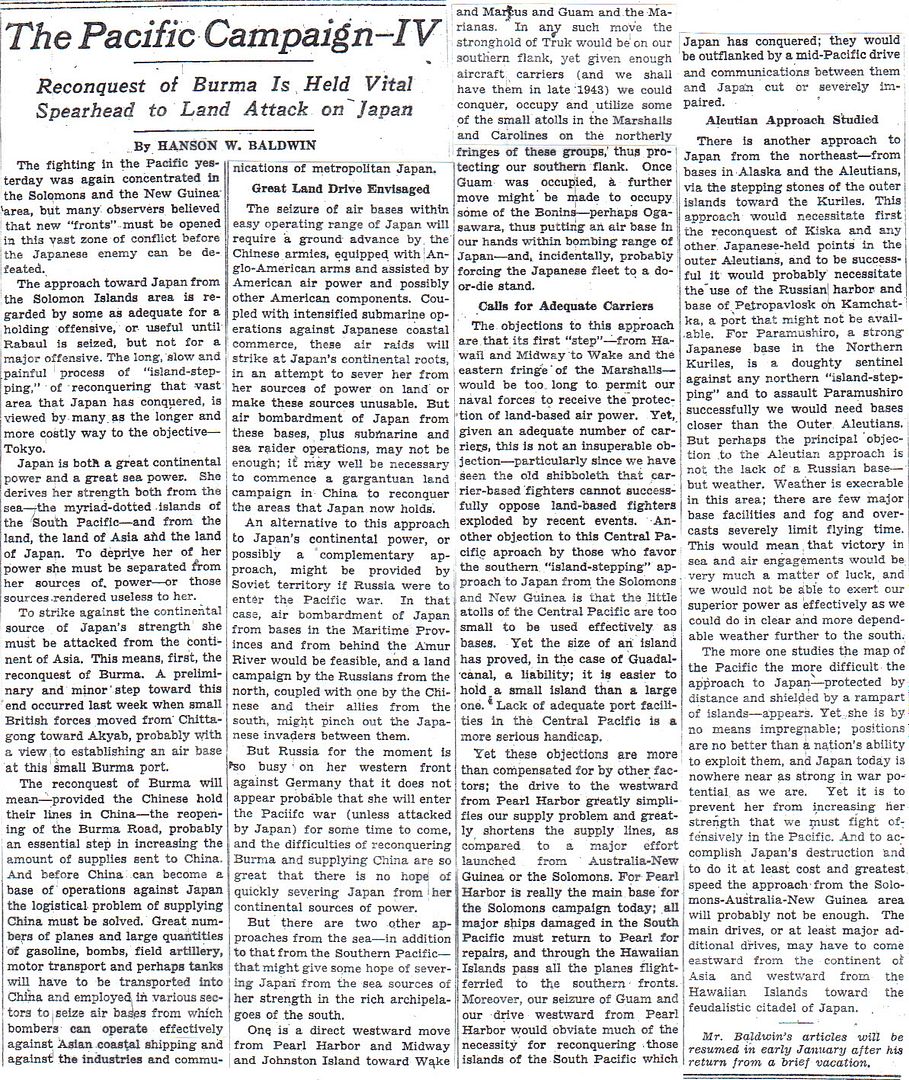
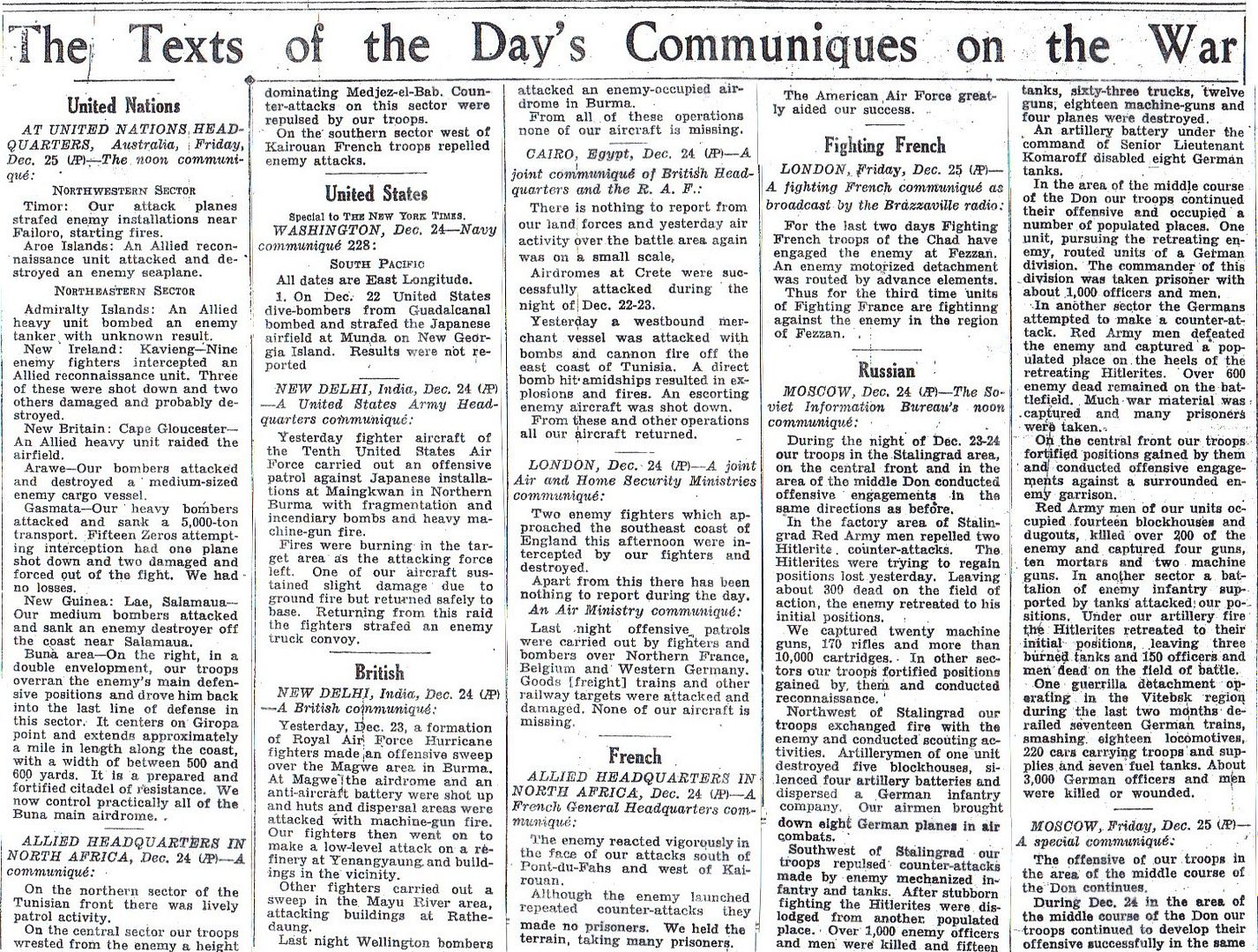
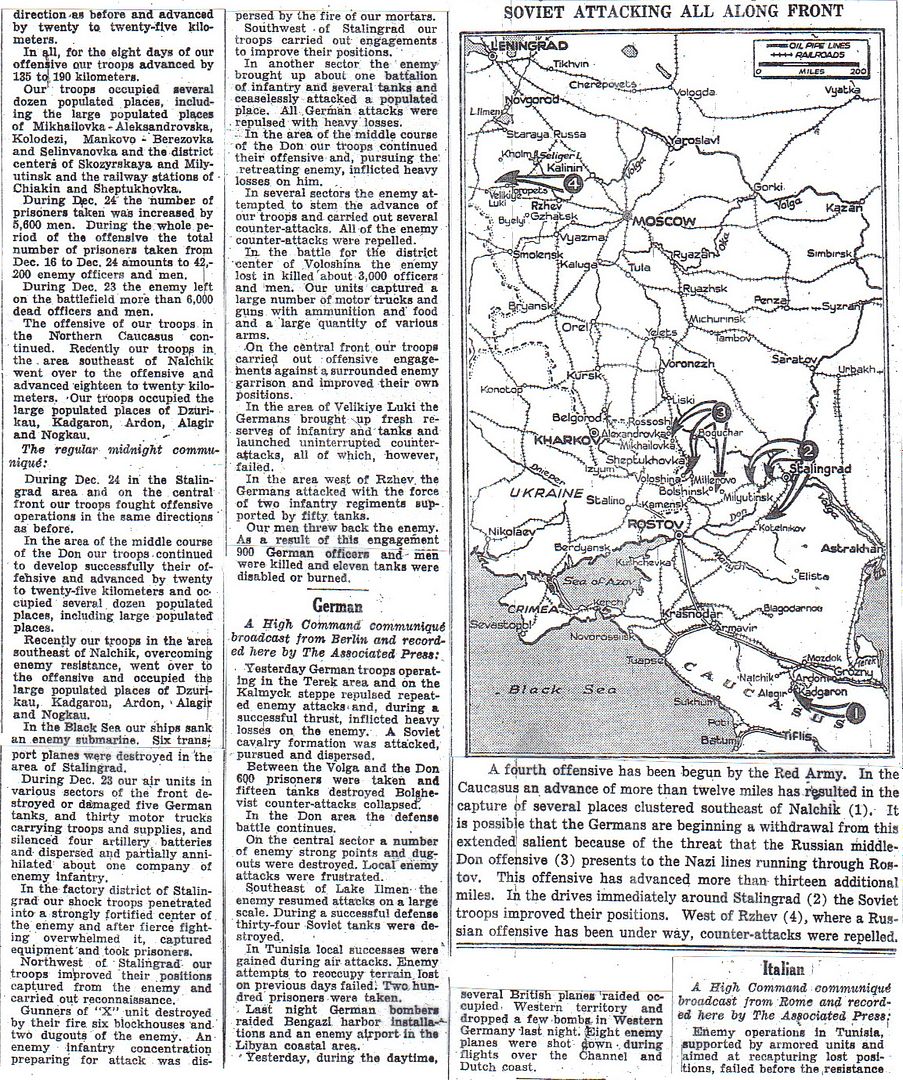
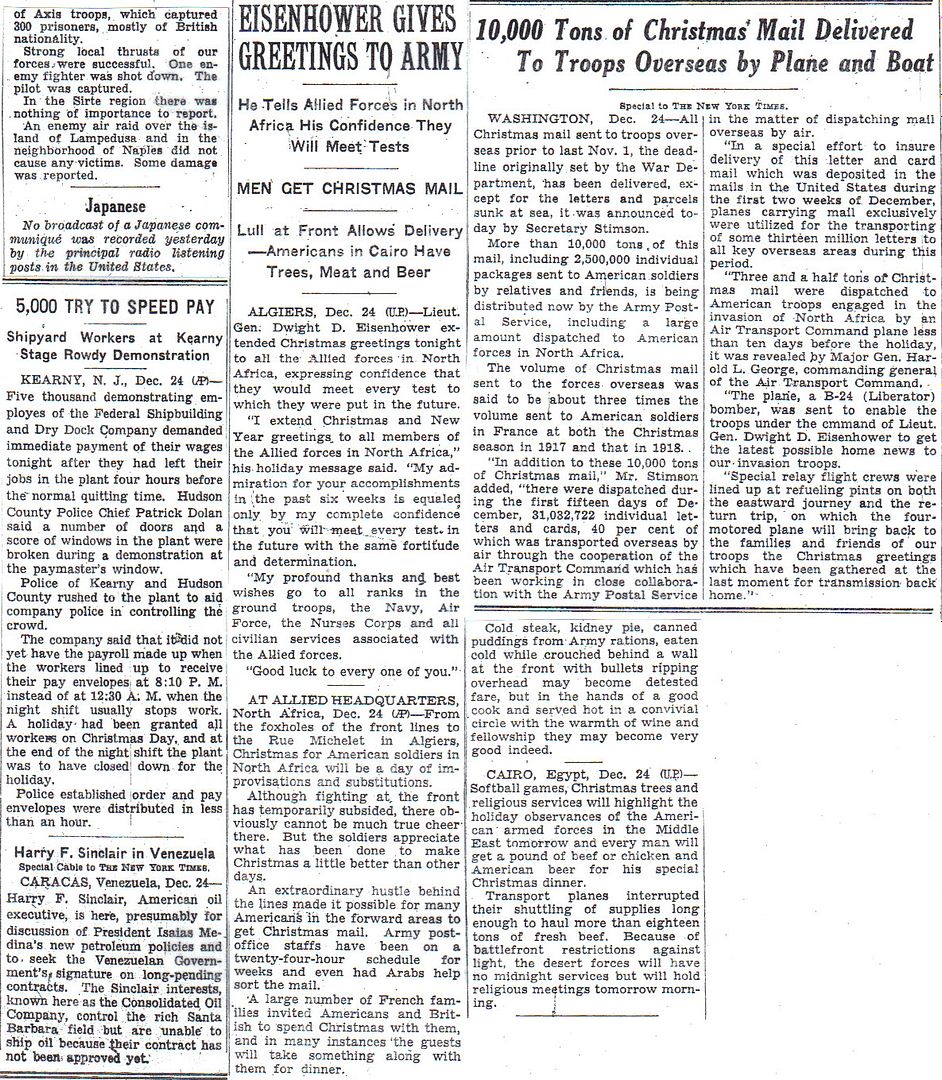
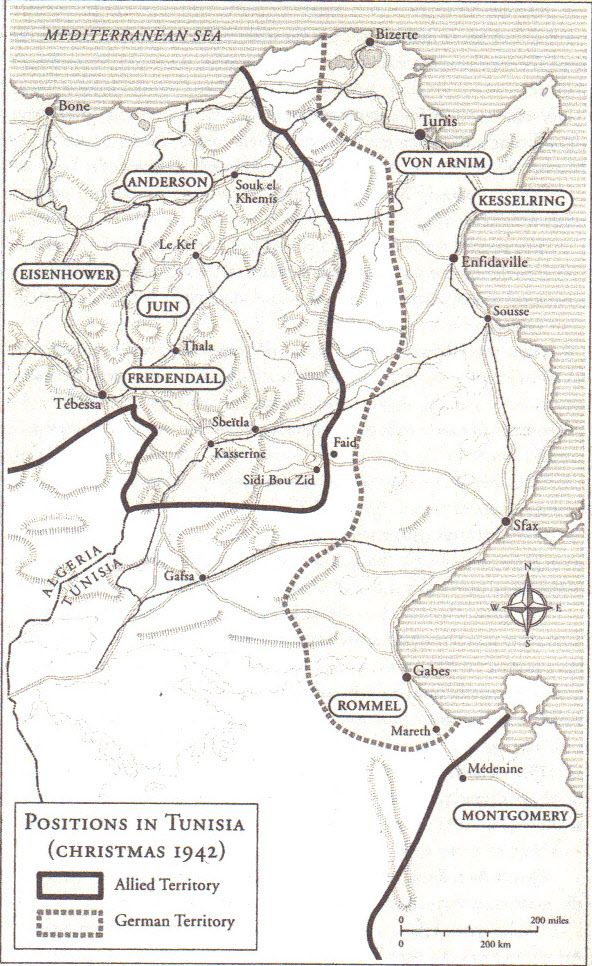
Jeff, Shaara, The Rising Tide
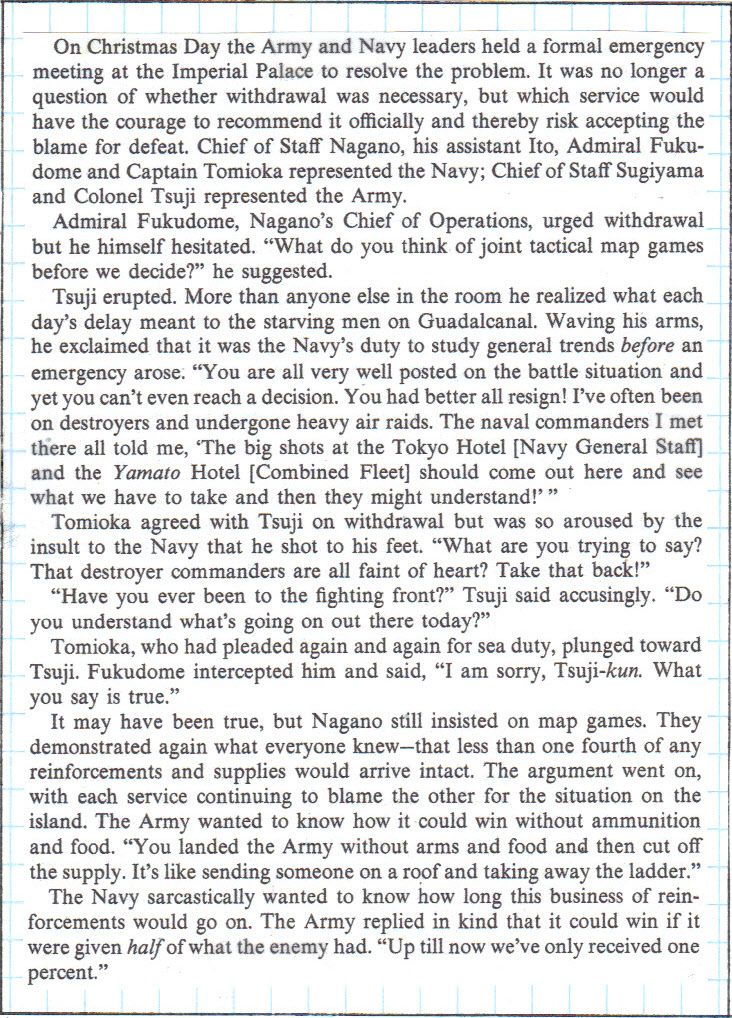
John Toland, The Rising Sun: The Decline and Fall of the Japanese Empire, 1936-1945
Merry Christmas, everybody.
Assassin is Seized – 2
War News Summarized – 2
Axis Hit in Tunisia (Middleton) – 3
Russians in Alagir (Parker) – 4
Allies Overrun Buna Defenses; Sink Destroyer and Transport (Durdin) – 5
Stars of Christmas Cheer Yanks in Arctic and Jungle – 6
Pope Assails Peril of ‘Godless State’ – 7
The Pacific Campaign-IV (Baldwin) – 8
The Texts of the Day’s Communiques on the War – 9-11
Eisenhower Gives Greetings to Army – 11
Merry Christmas, everybody.
Assassin is Seized – 2
War News Summarized – 2
Axis Hit in Tunisia (Middleton) – 3
Russians in Alagir (Parker) – 4
Allies Overrun Buna Defenses; Sink Destroyer and Transport (Durdin) – 5
Stars of Christmas Cheer Yanks in Arctic and Jungle – 6
Pope Assails Peril of ‘Godless State’ – 7
The Pacific Campaign-IV (Baldwin) – 8
The Texts of the Day’s Communiques on the War – 9-11
Eisenhower Gives Greetings to Army – 11
Thanks for the Times articles — this is what real news used to look like and why the Times used to be my favorite newspaper.
http://www.onwar.com/chrono/1942/dec42/f25dec42.htm
US aircraft raid Japanese base
Friday, December 25, 1942 www.onwar.com
US B-17 bombers now operated from Guadalcanal [photo at link]
In New Britain... The Japanese base at Rabaul is attacked by bombers from Guadalcanal.
In North Africa... Libya, The Axis garrison of Sirte withdraws.
In Tunisia... German forces retake Longstop Hill.
In Burma...Patrols from the 123rd Brigade reach Rathedaung and report that the Japanese have evacuated. This is not the case and actually Japanese reinforcements are on the way.
http://homepage.ntlworld.com/andrew.etherington/frame.htm
December 25th, 1942
U.S.S.R.: Leningrad: As this year draws to a close it is the plight of the Germans encircled by the Red Army at Stalingrad that attracts world attention. Yet 1,000 miles to the north it is the Russians who are besieged in a struggle for survival every bit as desperate: Leningrad has now been under siege for 15 months.
This Christmas Day a rat would be considered a great delicacy in Leningrad. The cats and dogs were eaten a year ago. After the Germans failed to take the city by storm, they settled down to starve it to death; but the food supply, brought in by boat across Lake Ladoga in the summer and across the ice in the winter, has been stabilized, and the citizens have learnt how to cope with the intermittent bombing and shelling.
However, nothing can minimize the suffering and the bravery of the people of Leningrad. One million of them have been evacuated by the boats and lorries making the hazardous journey across Lake Ladoga, but for many there has been no escape except by death.
A schoolgirl, Tania Savich, has kept a diary. It records the death of her family from starvation: “Jenia died on 28 December 1941 at 12.30 am. Grandmother died on 25 January 1942. Lena died on 17 March 1942. Uncle Lesha died on 10 May at 4.00pm. 13 May at 7.30am darling Mama died.”
THE STALINGRAD MADONNA
“According to the calendar, at Stalingrad as in the rest of the world it was now Christmas. This was not Christmas as any civilian had ever envisaged it. By day grey skies lowered over the endless expanse of snow covered steppe; by night a thin sickle of a moon cast a faint light on the frozen scene. The cold was pitiless. Let us see what it was like, that Christmas of 1942, at 42 deg. of longitude east of Greenwich.
Six private soldiers were assembled in a mortar position on Point 137. The seventh private who spoke to them had, once upon a time, been a clergyman in Dresden. He said: ‘This Stalingrad Christmas is a declaration of our Faith, made in the front line. He who lives to tell of it, or who remembers it in years to come, should with open eyes and a proud heart cast his thoughts back to the city beside the Volga, the Golgotha of the Sixth Army.’
They did not sit down to any festive board in Stalingrad. There were no bowls of apples and nuts, and only a very few, very small Christmas trees that had been included in the troops Christmas parcels. Any man lucky enough to possess a candle would let it burn for a few minutes, stuck into the neck of a bottle, or standing on a board beside his range-tables, or on his steel helmet, or in an empty crate, or on some twig that had once been part of a bush or tree. Then he would blow it out and put it carefully away. He would need that candle in the nights to come. This was no time for Christmas trees and speeches. Ammunition and bread were the finest presents that a man could hope for. But each man spared a thought for the comrade who stood beside him. There were many familiar faces missing, and those who remained moved closer together. Their tables were boards and upturned packing cases, their glasses tin mugs. A lucky man might have schnapps in his, a really lucky one wine, but few were as fortunate as that. For most of them their Christmas cheer was “German tea”, or melted snow.
In these last few weeks men had learned to express themselves with brevity. They were a silent lot these days. Thus did Christmas appear, at least externally. As for what the men felt, that is far harder to say, since feelings can only be expressed during the moment of their brief existence.
However, it is certain that their emotions leaped the many thousands of miles that separated this place of purgatory and doom from the homes of those whom they loved. What they all had in common was their universal destitution, and the grey sky overhead. During those Christmas days that sky was flecked with much red, when the few remaining buildings burned, and it was hard to believe that this could be God’s mantle. Nor could there be much talk of peace on earth. Why, they wondered, did the Almighty allow Christmas to succeed Christmas while His words of love were made inaudible by the din of men engaged in mutual slaughter?
The Christmas cheer had been stored at Karpovka. The bottles were all broken by now. Nine days before the encirclement was complete, a special train of forty-three wagons had arrived from Oels. Part of its contents had been brought across the Don and stored at Chir and Kalatch; three thousand seven hundred and sixty four cases of wines, champagne, liqueurs, and brandy. The champagne bottles had already burst in transit, owing to the extreme cold. Retreating soldiers had tucked some ten thousand bottles under their arms as they hurried past the warehouses. A hundred thousand more went down the throats of the Red Army, toasting their victory. There were no letters from home. Very occasionally a mail bag or two would find its way into one of the transport planes, but what was that among so many? The truth is that three hundred and eighty sacks of letters, addressed to the Stalingrad soldiers, were burned at Shiov on the first day of the Russian breakthrough, simply because the new Field Postmaster, who had just arrived from Dresden, was not up to the job. True enough, a few Russian tanks were reported six or seven miles away; but why then did it not occur to him to toss one of his mail bags onto each of the trucks that were pouring by, nose to tail, along the road to Nijni-Chirskaia?
Three hundred and eighty sacks of mail take a lot of burning. When a mere one hundred had gone up in flames, the Russians arrived. In early January the Red Army was still smoking German cigarettes. At Yassinovotaia thirty-two railway trucks, containing three and a half million Christmas parcels, stood on a siding. The trucks were needed for another purpose. The parcels were therefore taken out, stacked and covered with tarpaulins. In late January, on instructions from the Army Field Postmaster, the parcels were distributed among the hospitals, insofar as they were still worth distributing.
It was often said in the Stalingrad pocket that it was better to have a cousin in the Luftwaffe than a Father in Heaven. A few dozen had cousins in the Luftwaffe. For them there might be roast goose, tongue in aspic, Chablis and Martell. For the others there was bean soup, horse stew or turnips boiled in melted snow; iron rations or biscuit. Others again simply dined off the flesh of horses the wolves had killed, eaten raw and without salt. For most of them Christmas was a bitter day. They talked, wondered whether or not they would get their ration of one-quarter pound of bread, relied, or did not rely, on their Fuhrer’s promises. Dr.Goebbels had thought up a good idea for Christmas, a great wireless hook-up between German soldiers and civilians wherever they might be. Listening to this cheery programme in Stalingrad, the soldiers cursed or laughed, depending upon each man’s temperament.
During the night before Christmas, twenty-six men died. Their names were recorded, and their comrades stood in mourning beside the holes in the snow into which their bodies were lowered. Four weeks later tens of thousands were simply left to lie where they fell. In a wooden house near Vorponovo, eleven men of the 71st Infantry Division were celebrating Christmas. At first they sang “Silent Night, Holy Night” and they sang it very well. Then they began another hymn, “O du Froehliche”, and one of them played the tune on his accordion. They all knew the words of the first verse: only three men could sing the second: with the third, silence fell, save for the accordion. Suddenly a strange voice sang the third verse loud and clear, a beautiful, strong voice. It came from the adjoining compound where the prisoners of war were kept. Though he sang in German, the singer was a Russian soldier.
On Christmas Eve, three men risked their lives fetching a small pine tree from the little wood near Gumrak. They decorated it with stars cut out of silver paper, and candles, and ornaments made of black out material. That evening the illuminated tree stood upon Hill 137, its candles visible from afar. For an hour it stood there, before it was destroyed by enemy mortar fire.
Very many people have heard tell of the “Stalingrad Madonna” without perhaps knowing how she came to exist nor who drew her. It happened in the days before Christmas, in the ruins of Stalingrad on which the enemy’s shells and bombs were constantly bursting. The dug-out belonging to the Senior Medical Officer, Dr.Kurt Reuber, was divided into two by a hanging blanket. On one side of it Dr.Reuber tended the wounded and the dying; on the other, where were his tiny living and sleeping quarters, he drew a picture for those poor men’s celebration of Christmas, the last Christmas that most of them would ever see. He knew that words no longer meant much to them, but that their eyes could still see. An in silence this picture of the Mother, with her child swathed in a white mantle which yet seems to reveal an inner light, entered into his comrade’s souls. What Kurt Reuber and his comrades underwent is described in his last letter:
‘Christmas week has come and gone. It has been a week of watching and waiting, of deliberate resignation and confidence. The days were filled with the noise of battle and there were many wounded to be attended to. I wondered for a long while what I should paint, and in the end I decided on a Madonna, or mother and child. I have turned my hole in the frozen mud into a studio. The space is too small for me to be able to see the picture properly, so I climb on to a stool and look down at it from above, to get the perspective right. Everything is repeatedly knocked over, and my pencils vanish into the mud. There is nothing to lean my big picture of the Madonna against, except a sloping, home-made table past which I can just manage to squeeze. There are no proper materials and I have used a Russian map for paper. But I wish I could tell you how absorbed I have been painting my Madonna, and how much it means to me.
‘The picture looks like this: the mother’s head and the child’s lean toward each other, and a large cloak enfolds them both. It is intended to symbolize “security” and “mother love.” I remembered the words of St. .John: light, life, and love. What more can I add? I wanted to suggest these three things in the homely and common vision of a mother with her child and the security that they represent. When we opened the “Christmas Door”, as we used to do on other Christmases (only now it was the wooden door of our dug-out), my comrades stood spellbound and reverend, silent before the picture that hung on the clay wall. A lamp was burning on a board stuck into the clay beneath the picture. Our celebrations in the shelter were dominated by this picture, and it was with full hearts that my comrades read the words: light, life, and love.
‘I spent Christmas evening with the other doctors and the sick. The Commanding Officer had presented the doctor with his last bottle of Champagne. We raised our mugs and drank to those we love, but before we had had a chance to taste the wine we had to throw ourselves flat on the ground as a stick of bombs fell outside. I siezed my doctor’s bag and ran to the scene of the explosions, where there were dead and wounded. My shelter with its lovely Christmas decorations became a dressing station. One of the dying men had been hit in the head and there was nothing more I could do for him. He had been with us at our celebration, and had only that moment left to go on duty, but before he went he had said: “I’ll finish the carol with first. O du Froehliche!” A few moments later he was dead. There was plenty of hard and sad work to do in our Christmas shelter. It is late now, but it is Christmas night still. And so much sadness everywhere.”
Many dead German soldiers lay about the “Red Barricade” factory. Four of them had been buried by their friends beneath a tank, which had been blown up on Christmas Eve. They had been buried there because there was no snow under the tank. For a few hours a single candle burned upon the wreckage. There are many graves, but here was the loneliest Christmas in all the world.”
*******
From: STALINGRAD by Heinz Schroeter EP Dutton,1958.
The Stalingrad Madonna (pics): http://www.quatember.de/J1983/q83230b.htm
http://www.pcusa.org/2003advent/madonna.htm
http://ingeb.org/ballads/madonna_.html
http://www.volksbund.de/schon_gelesen/spektrum/stalingrad_erinnerung/
See also: “Paulus and Stalingrad” by Walter Goerlitz. and “Stalingrad” by Antony Beevor.
- Russ Folsom
MEDITERRANEAN SEA: Submarine HMS P-48 sunk in Gulf of Tunis (37-15N, 10-30’E) by depth charges of Italian destroyer escorts Ardente, Ardito and possibly Audace, NW of Zembra Island. Attacking Italian convoy making for Tunis. (Dave Shirlaw)
NORTH AFRICA: Axis forces evacuate their outflanked garrison at Sirte in Libya.
German forces retake Longstop Hill in Tunisia. Captured by the Allies the day before yesterday, this spot continues to be fought over by both sides, despite the supply difficulties of each.
Whilst on patrol in the approaches to Tunis, U class submarine P.48 is located by Italian destroyer Ardito and Ardente off Zembra Island and depth charged to destruction. There are no survivors. (Alex Gordon)(108)
SOLOMON ISLANDS: The Air Solomons Command, flying from Henderson Field on Guadalcanal, bombs Rabaul.
The raid consisted of eleven B-17s that attacked shipping and port facilities at Rabaul. (Jack McKillop)
BURMA: Advance units of the British 123rd Brigade reach Rathedaung. They report the Japanese have evacuated, a Japanese relief column is in fact advancing on Rathedaung.
ATLANTIC OCEAN: The US motorship SS Doña Aurora is sunk by the Italian submarine ENRICO TAZZOLI. (Keith Allen)
"This women's band performed at the Vittel detention camp in France.
Relatively good conditions prevailed there as long as the Gestapo sought to trade foreign nationals and Jews with valid foreign passports for German nationals held by the Allies.
In spring 1944, however, Jews with valid papers from occupied and belligerent nations were shipped to the Drancy, France, transit camp. European Jews holding transit documents from Latin American countries (most of which were neutral) were sent to Auschwitz, in part because the countries that had issued the papers repudiated them."
"Among the Vilna (Lithuania) Ghetto's most extraordinary accomplishments was its library.
This poster from December 1942 celebrates the library's lending of its 100,000th book.
Organized by the library's director, Hermann Kruk, the occasion celebrated the community's love of literature and commitment to learning even during these cruel times.
Reading provided both entertainment and escape from the harshness of daily life in the ghetto."
"Events in 1942 illustrate why the Holocaust provokes controversy about the Vatican and the Roman Catholic Church.
The church's European network--bishops, diplomats, couriers, priests, and their parishioners--kept the Vatican and Pope Pius XII (pictured) informed about the fate of Europe's Jews.
Nevertheless, responding to reports about deportations and mass killings that occured in 1941 and 1942, Vatican Secretary of State Cardinal Luigi Maglione regarded the news as unverified if not exaggerated.
"Anxious for papal condemnation of Nazi Germany's treatment of the Jews, the Allies urged Pius XII to support a December 17, 1942, declaration entitled "German Policy of Extermination of the Jewish Race."
The Vatican had protested atrocities in general, Cardinal Maglione replied.
He went on to explain, however, that the Pope could not publicly condemn particular atrocities.
"On December 24 Pius XII, in a veiled reference to Jews, lamented the "hundreds of thousands who through no fault of their own, and sometimes only because of their nation or race, have been consigned to death or slow decline."
"Disputes about what the Vatican could or should have done during the Holocaust will be clarified but not resolved when its wartime archives are fully opened."
Hmmm...Pope denounces Marxist socialism and (equivalent of) fascism and calls for “Christian crusade” to establish “new world order”...
“Shaara’s book is fiction, but I believe the maps are intended to be historically accurate.”
I don’t think so. See post 5. Sitre is well to the east of the line on the map - perhaps 400 miles.
“The US motorship SS Doña Aurora”
Shouldn’t that be MS Doña Aurora, rather than SS Doña Aurora?
You are right. According to Map #5 on my profile the British didn’t advance west as far as Tunisia until February.
The Pope specifically denounced Marxism, but made nothing but vague references to Nazism or the deportations of Jews.
colo9rado tanker: "The Pope specifically denounced Marxism, but made nothing but vague references to Nazism or the deportations of Jews."
The historical question is why was the Pope so vague?
Answers range from allegations of "Hitler's Pope" to my theory, which is that the Church itself was held hostage, often in the same death camps used to exterminate Jews, and the Pope's silence was necessary to buy protection, or at least life, for clergy and other Christians.
Disclaimer: Opinions posted on Free Republic are those of the individual posters and do not necessarily represent the opinion of Free Republic or its management. All materials posted herein are protected by copyright law and the exemption for fair use of copyrighted works.